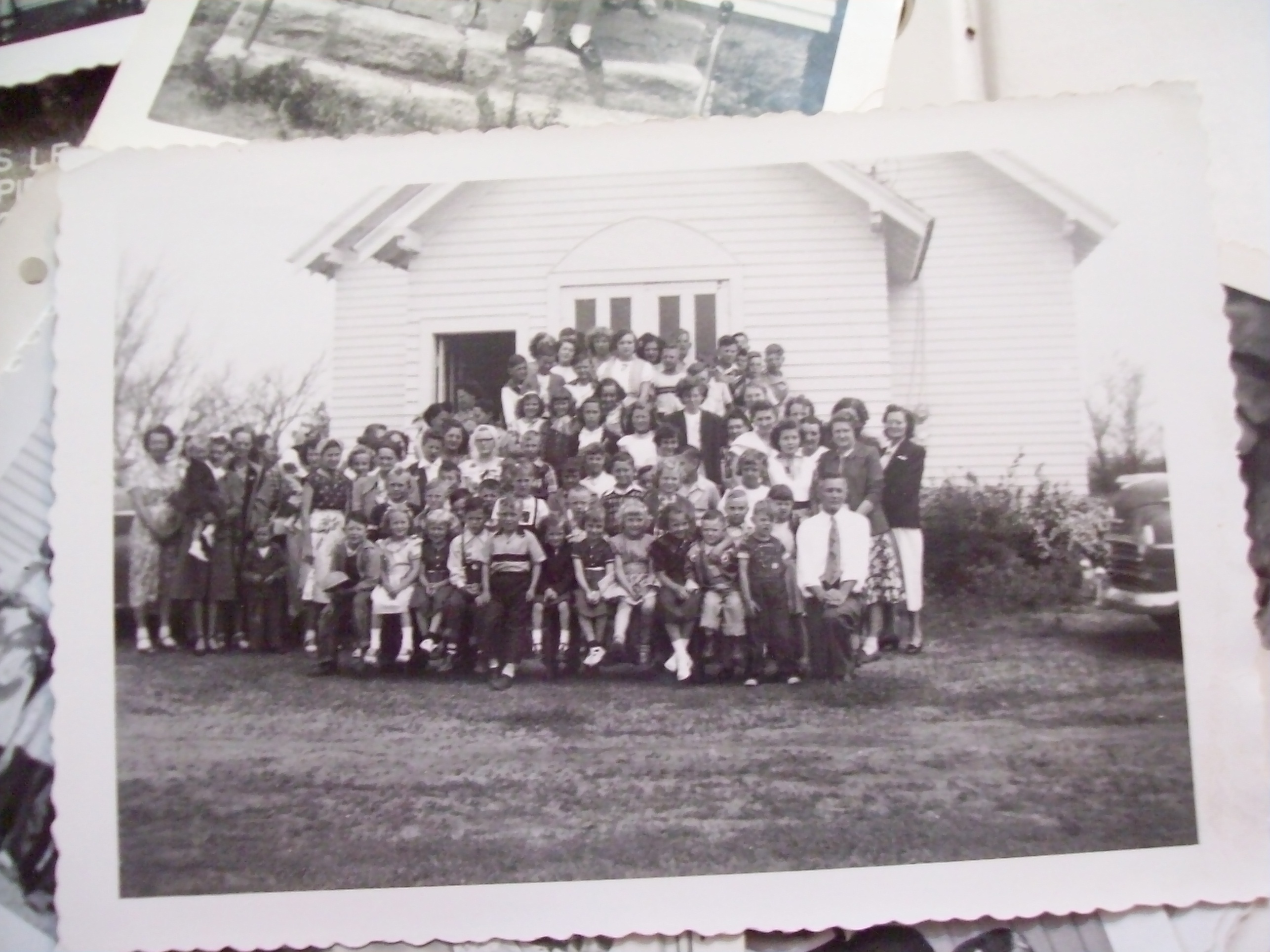Yesterday, I attended the morning worship service at the little country church my mother grew up in.
A cousin hands us the program before we file in to the back row, where a shortened pew leaves room for Grandpa’s wheelchair. We open our programs and find the hymns in the hymnal. An older parishioner realizes that the hymn board still lists last week’s hymns. He corrects the board as I idly wonder why Virginia has not yet taken her place at the organ.
My cousin and another man act as the accolytes, and we wait for the pastor to appear. When the vacancy pastor emerges from the back room, my unasked question receives an answer. Virginia is gone, so we’ll be singing with a CD recording.
We sit for the opening hymn and the pastor cues up the CD player with a little remote. As strains of an organ diffuse through the building, I sing unfamiliar words to a familiar tune, played with unfamiliarly correct timing. The timing throws off more than just I and we lose ourselves a couple of times.
Nonetheless, the service flows smoothly enough. The new hymnal throws me off a few times. You’d think that I’d be more flexible than I am. After all, I only worship with a liturgy when I’m here at St. Paul Venus. I am only familiar enough with the liturgy to be distressed when something changes–it throws me off when the words I’m reading don’t jibe with the words my head thinks they should be speaking. It’s the little things that throw me off–a “You” where I remember a “Thee”.
When the service ends, we make our way to the narthex. The men open both doors to get Grandpa’s wheelchair through, then circle at the bottom of the steps to discuss whatever they do. We women bunch up in the narthex, exchanging greetings. One woman says she remembers my older sister from Bible study, but Grandma’s pretty sure she’s actually remembering me. I vaguely remember being rather talkative at an after-church Bible study during one visit.
I remember us kids swinging on the rail along the front steps. We’d play on the green indoor-outdoor carpeting until one of the ladies told us they had Sunday school ready for us. So we trooped down to the basement for Sunday school. At first, there were other kids; but by my later elementary years, we were the only kids in Sunday school. Whoever was in charge of Sunday school had something ready in case some kids showed up, but children were few and far between. I no longer fill the “kid” category–and Marlene and Richard were celebrating their 50th wedding anniversary with donuts in the basement–so there wasn’t any Sunday school following our service.
St. Paul Venus celebrated 95 years this spring. 95 years of baptizing babies, confirming young eighth graders, sending graduates off to school. 95 years of returning children, new grandchildren, great-grandchildren home on holidays. St. Paul reflects the neighborhood–aging, dwindling, reluctantly changing as necessity demands.
It’s a wonder the St. Paul Venus congregation still exists. In a rural community where most of the parishioners are retirees–or would be if they could afford to retire–there’s hardly the money to support a pastor. In fact, it’s been years since St. Paul has been able to pay a pastor’s salary. A nearby parish shares its pastor for an hour and a half every Sunday morning. Tithes pay for heating and electricity.
I don’t know how much longer this little country church will stand. Venus, Nebraska is little more than a historical postscript. Who knows how much longer before St. Paul follows the town.
I can’t help but feel melancholy as I think of this little church someday being forgotten. For when it is forgotten, so will a great deal of my history and my family’s history. St. Paul Venus features prominently in the stories of my past.
Grandpa’s favorite story is of looking at a cute young Carol Pierce on the Sunday school bench. They were both preschoolers, but Grandpa says he looked over at her one week and thought “My, that Carol Pierce is awful pretty. When I grow up, she’s gonna be my girlfriend.” The next week, he looked over and thought a variation on his first thought: “My, that Carol Pierce is awful pretty. When I grow up, she’s gonna be my wife!” And sure enough, when they were grown, Carol Pierce became his wife.
They were married in the very church where at least fifteen years prior Ronald Cook had decided he would like to marry Carol Pierce. They baptized each of their twelve children in this same church–and saw them confirmed there. At least two of their daughters were married at St. Paul, and a few grandchildren were baptized there as well. When Grandma and Grandpa’s progeny expanded to no longer fit within their home, they moved family gatherings to the church.
I remember playing games in the church basement before moving upstairs to sing hymns around the organ or Aunt Nellie’s electric piano. We all rifled through the hymnals, searching for our favorites, while the kids threw out suggestion after suggestion. There wasn’t a dry eye in our familial congregation when Grandpa asked for his favorites: “In the Garden” or “On Christ the Solid Rock I stand”.
I remember Grandpa standing up to tell his stories after dinner. He’d tell us the story of Grandma and him on the Sunday school bench, and the story of the man who encouraged him and Grandma to “Be fruitful and increase”. He’d tell of how proud he is of his sons-in-law–he feels that they take more after his father-in-law than him.
And I remember the slide show Aunt Martha put together for their wedding anniversary celebration one year. We were watching it in the church basement when a reproduction of a the postcard he sent Grandma from Korea came onto the screen. “Turn it over,” Grandpa yelled. Sure enough, the next slide showed the back of the card–Grandpa was coming home. I’m sure I wasn’t the only one crying. He made it back safely after his time on the front lines in Korea–back to his bride.
My memories of the little country church are only the beginning of the histories that building could tell. The photo albums I perused yesterday held few familiar faces–but I could recognize St. Paul Venus in the background, telling the stories of the generations before.

 Prompt: What type of extra-curricular school activities did you participate in during your school days? Clubs? Spelling bees or other contests? Cheerleader or drill team? Sports? Journalism? Choir or theater? …
Prompt: What type of extra-curricular school activities did you participate in during your school days? Clubs? Spelling bees or other contests? Cheerleader or drill team? Sports? Journalism? Choir or theater? …
